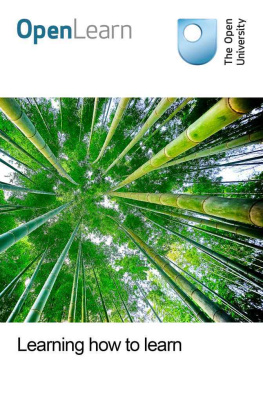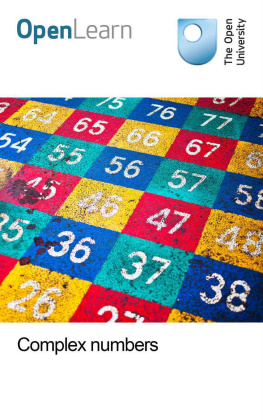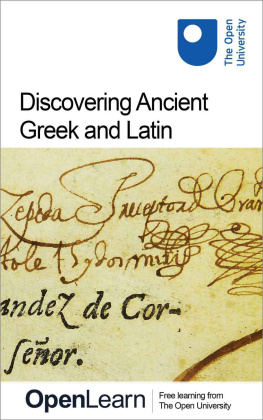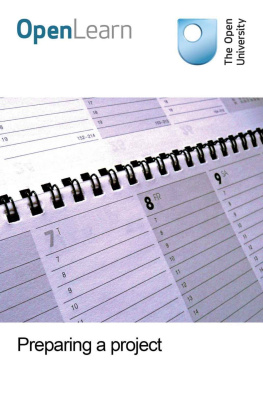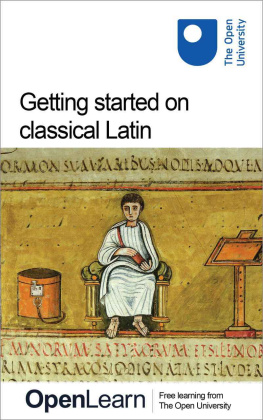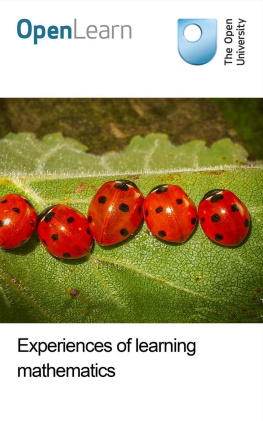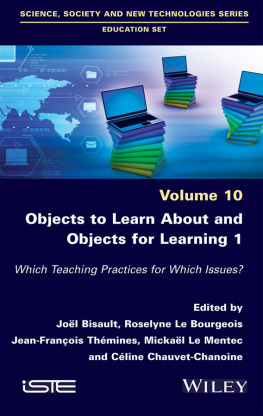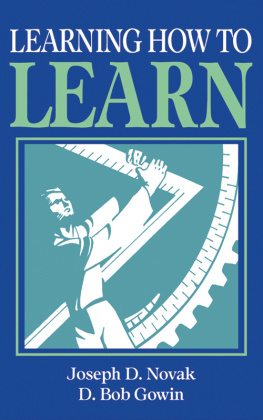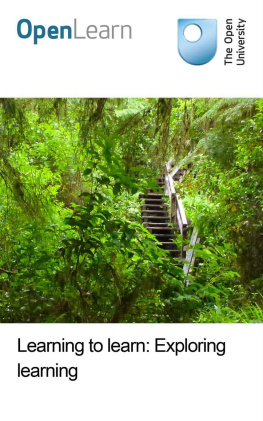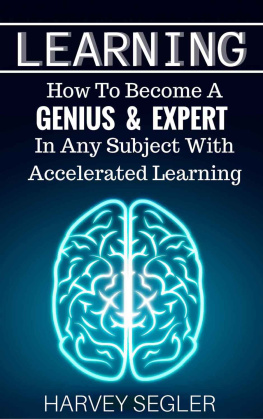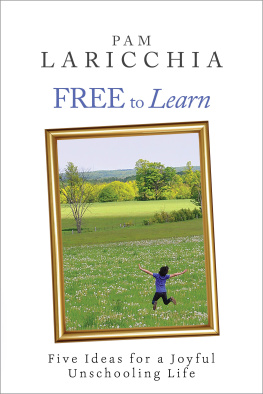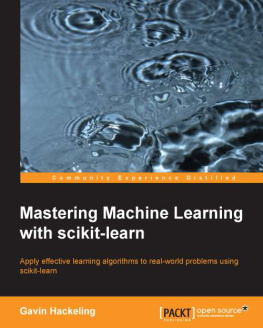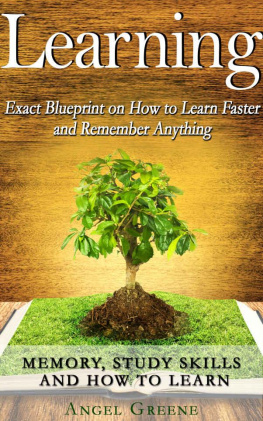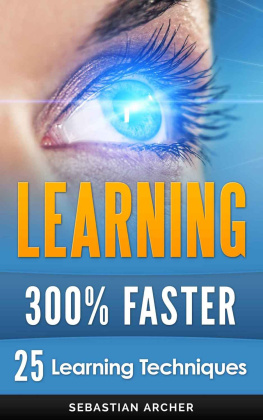University - Learning how to learn
Here you can read online University - Learning how to learn full text of the book (entire story) in english for free. Download pdf and epub, get meaning, cover and reviews about this ebook. year: 2016, publisher: The Open University, genre: Religion. Description of the work, (preface) as well as reviews are available. Best literature library LitArk.com created for fans of good reading and offers a wide selection of genres:
Romance novel
Science fiction
Adventure
Detective
Science
History
Home and family
Prose
Art
Politics
Computer
Non-fiction
Religion
Business
Children
Humor
Choose a favorite category and find really read worthwhile books. Enjoy immersion in the world of imagination, feel the emotions of the characters or learn something new for yourself, make an fascinating discovery.
- Book:Learning how to learn
- Author:
- Publisher:The Open University
- Genre:
- Year:2016
- Rating:3 / 5
- Favourites:Add to favourites
- Your mark:
- 60
- 1
- 2
- 3
- 4
- 5
Learning how to learn: summary, description and annotation
We offer to read an annotation, description, summary or preface (depends on what the author of the book "Learning how to learn" wrote himself). If you haven't found the necessary information about the book — write in the comments, we will try to find it.
Learning how to learn — read online for free the complete book (whole text) full work
Below is the text of the book, divided by pages. System saving the place of the last page read, allows you to conveniently read the book "Learning how to learn" online for free, without having to search again every time where you left off. Put a bookmark, and you can go to the page where you finished reading at any time.
Font size:
Interval:
Bookmark:
About this free course
Find out more about studying with The Open University by visiting our online prospectus.
This version of the content may include video, images and interactive content that may not be optimised for your device.
You can experience this free course as it was originally designed on OpenLearn, the home of free learning from The Open University - http://www.open.edu/openlearn/education/learning-how-learn/content-section-0.
There youll also be able to track your progress via your activity record, which you can use to demonstrate your learning.
The Open University,
Walton Hall,
Milton Keynes,
MK7 6AA
Copyright 2016 The Open University
Intellectual property
Unless otherwise stated, this resource is released under the terms of the Creative Commons Licence v4.0 http://creativecommons.org/licenses/by-nc-sa/4.0/deed.en_GB. Within that The Open University interprets this licence in the following way: www.open.edu/openlearn/about-openlearn/frequently-asked-questions-on-openlearn. Copyright and rights falling outside the terms of the Creative Commons Licence are retained or controlled by The Open University. Please read the full text before using any of the content.
We believe the primary barrier to accessing high-quality educational experiences is cost, which is why we aim to publish as much free content as possible under an open licence. If it proves difficult to release content under our preferred Creative Commons licence (e.g. because we cant afford or gain the clearances or find suitable alternatives), we will still release the materials for free under a personal end-user licence.
This is because the learning experience will always be the same high quality offering and that should always be seen as positive even if at times the licensing is different to Creative Commons.
When using the content you must attribute us (The Open University) (the OU) and any identified author in accordance with the terms of the Creative Commons Licence.
The Acknowledgements section is used to list, amongst other things, third party (Proprietary), licensed content which is not subject to Creative Commons licensing. Proprietary content must be used (retained) intact and in context to the content at all times.
The Acknowledgements section is also used to bring to your attention any other Special Restrictions which may apply to the content. For example there may be times when the Creative Commons Non-Commercial Sharealike licence does not apply to any of the content even if owned by us (The Open University). In these instances, unless stated otherwise, the content may be used for personal and non-commercial use.
We have also identified as Proprietary other material included in the content which is not subject to Creative Commons Licence. These are OU logos, trading names and may extend to certain photographic and video images and sound recordings and any other material as may be brought to your attention.
Unauthorised use of any of the content may constitute a breach of the terms and conditions and/or intellectual property laws.
We reserve the right to alter, amend or bring to an end any terms and conditions provided here without notice.
All rights falling outside the terms of the Creative Commons licence are retained or controlled by The Open University.
Head of Intellectual Property, The Open University
Edited, designed and typeset by The Open University.
Printed and bound in the United Kingdom
978 1 47300 063 6 (.kdl)
978 1 47300 158 9 (.epub)
Learning how to learn is a process in which we all engage throughout our lives, although often we do not realise that we are, in fact, learning how to learn. Most of the time we concentrate on what we are learning rather than how we are learning it. In this course, we aim to make the process of learning much more explicit by inviting you to apply the various ideas and activities to your own current or recent study as a way of increasing your awareness of your own learning. Most learning has to be an active process - and this is particularly true of learning how to learn. Therefore, you will find that this course contains a number of activities for you to complete, which require you to make notes and keep records. You can either write these down in a notebook, or use word processor, whichever you feel most comfortable with.
Find out more about studying with The Open University by visiting our online prospectus.
After studying this course, you should be able to:
- think about and understand personal ways of learning
- apply the ideas and activities in this course to existing learning experiences
- learn reflectively.
Each activity is followed by a discussion and examples of the responses of two students. Both students are studying Open University courses that will eventually count towards a degree. These are nine month distance learning courses.
Course material is delivered to students by post, email or online. Their assignments are submitted by post or email, marked either by a computer or a tutor, and returned. Open University students are provided with a tutor, regular tutorials and guidance on completing assignments. They are also provided with online conferencing facilities to communicate with their tutor or with other students.
Both students have been provided with assignment booklets, which provide advice on completing their assignments. They also refer to Study Skills series of books, which are published by the Open University. The series includes books providing study skills advice in particular subject disciplines, as well as general study skills advice.
Tim is studying an introductory Humanities course and Sue is a biology student.
This activity will help you to explore what we mean by learning how to learn.
Think back to an example of study you have done in the past, or any fairly structured learning opportunity you remember. Focus on a particular activity or task when you were consciously engaged in learning. Jot down a brief description of what you were learning - what was the subject, topic or task? Having reminded yourself of that, write a brief description of how you were learning it.
Can you begin to see the difference between thinking about what you were learning and how you were learning; between the content of your study and the process of doing it? Only when you begin to examine the process are you likely to consider whether there might be other more effective ways of studying. We are certainly not suggesting that you engage in this activity every time you study, but being aware of the two dimensions of study and being able to analyse both of them is an important part of learning how to learn.
You will notice that the focus here is on learning - your learning. It may be that the example you chose to examine was an occasion when you were being taught to do something. In this course we do not look at the teaching side of the experience, although that does not mean it is unimportant. Here the emphasis is on you and your learning in any learning situation, and this places a considerable responsibility on you to think through the process. It also encourages you to understand more of what happens to you when you learn. As well as enhancing your learning, this can increase your control over your own learning; you may find this is an approach that is new to you, but do give it a try.
Font size:
Interval:
Bookmark:
Similar books «Learning how to learn»
Look at similar books to Learning how to learn. We have selected literature similar in name and meaning in the hope of providing readers with more options to find new, interesting, not yet read works.
Discussion, reviews of the book Learning how to learn and just readers' own opinions. Leave your comments, write what you think about the work, its meaning or the main characters. Specify what exactly you liked and what you didn't like, and why you think so.

